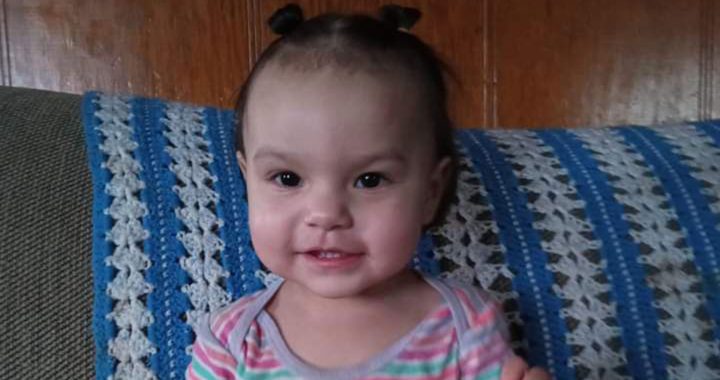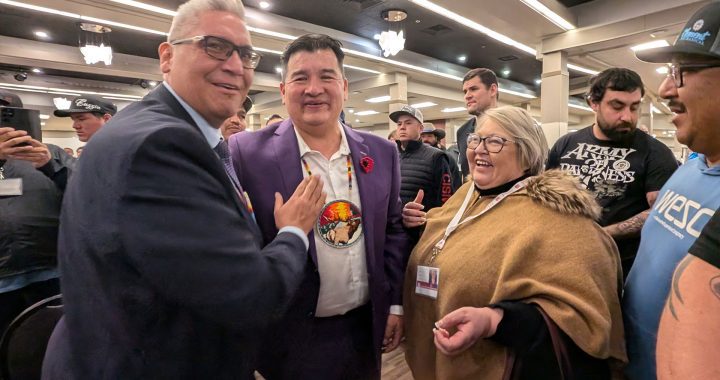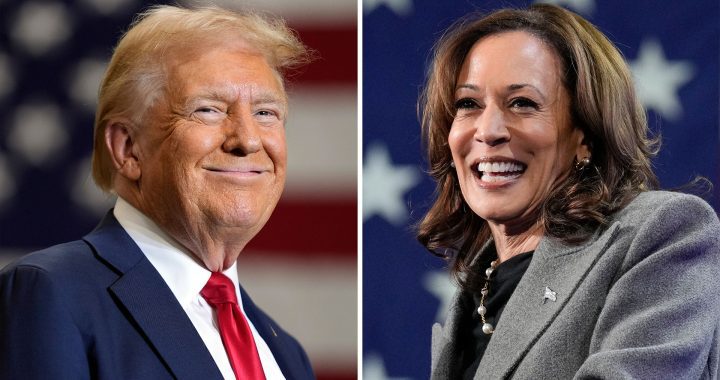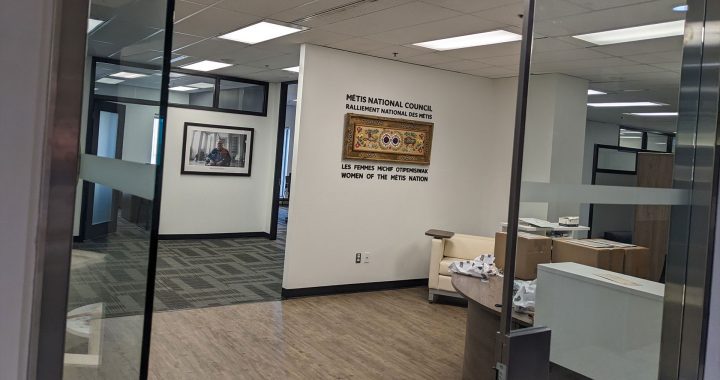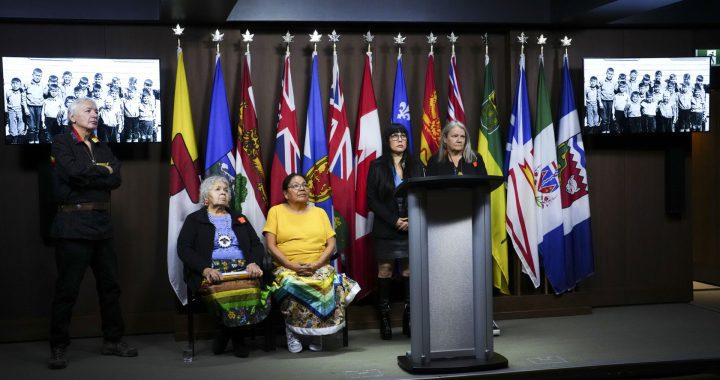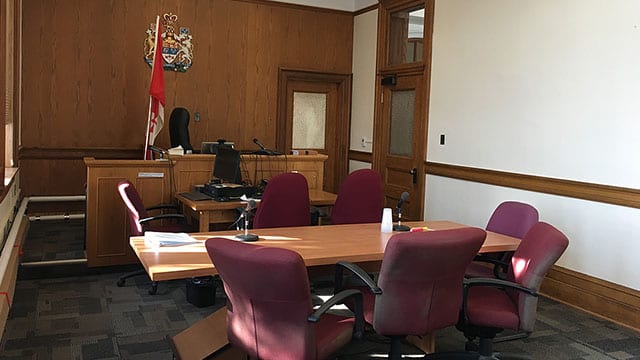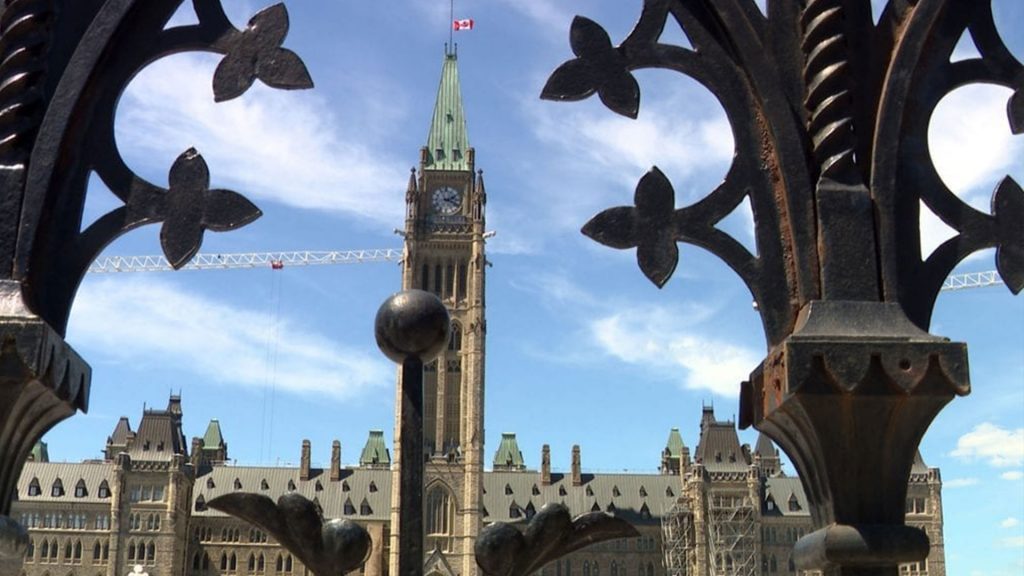
Prime Minister Justin Trudeau has called a federal election for Sept. 20. Photo: Jason Leroux/APTN.
With less than two weeks to go until the Sept. 20 federal election, observers have called it surprising and disappointing that Indigenous issues have fallen by the wayside on the campaign trail.
Only two months ago thousands of orange-clad marchers cancelled Canada Day, toppled colonial statues and demanded justice in cities across the country following the discoveries of unmarked graves on the grounds of former residential schools.
But the upcoming official French and English debates offer those vying to be prime minister a chance to shift the focus and lay their positions out clearly. APTN News has examined the major parties’ platforms on reconciliation, and here’s what some of them contained.
Liberals promise to continue work already started
Liberal Leader Justin Trudeau’s platform’s brief chapter on reconciliation uses the word “continue” or “continuing” more than 50 times in its pledges, which indicates the party plans to stay the course if re-elected to a third term.
The Liberals vow to “make any investments necessary” to finally supply clean water to all First Nations reserves and to “fully fund Jordan’s Principle,” which is a program the government is legally required to implement to ensure First Nations kids have equitable access to essential health and social services.
Trudeau also promises to continue implementing Liberal legislative initiatives to return jurisdiction over child welfare back to Indigenous governments and harmonize federal law with the UN Declaration on the Rights of Indigenous Peoples (UNDRIP).
The Liberals say they will continue work on implementing their action plan in response to National Inquiry into Missing and Murdered Indigenous Women and Girls (MMIWG). The party reiterates promises to reform the RCMP and tackle systemic racism in the justice system.
The Liberals want to ban the use of neck restraints and prohibit using tear gas or rubber bullets for crowd control. They also want to strengthen oversight and firm up the Civilian Review and Complaints Commission timelines, though addressing systemic racism in the force isn’t mentioned specifically.

Some key files Trudeau has left hanging reappear in the election platform as well. An agreement in principle to settle a class-action lawsuit over the lack of clean water on reserves remains to be finalized, which the party commits to doing. Trudeau has also pledged to compensate victims of the knowingly underfunded child welfare system by settling another national class action out of court. Confidential settlement talks were ongoing when the writ was issued.
Election promises to Indigenous people contained in the Liberal platform largely mirror those contained in the 2021 federal budget, which passed in Parliament, something commenters have noted.
“This prime minister couldn’t make the case that he couldn’t get things done, because everything was getting passed. He can’t point to a single piece of government legislation that was stopped because of the opposition,” said Cam Holmstrom, a Métis Nation member, former Hill staffer for New Democrat MP Romeo Saganash and consultant with public affairs firm Bluesky Strategy Group.
“Most of the stuff he’s put forward in his platform so far, it’s all things they could have done had they stayed,” Holmstrom said.
And from persistent drinking water advisories to the delayed MMIWG action plan, Trudeau has left a trail of missed deadlines and broken promises that could lead to cynicism among First Nations, Inuit and Métis voters, said Liam Midzain-Gobin, an assistant professor of political science at Brock University.
“The cynicism is frankly probably pretty fair,” Midzain-Gobin told APTN. “This is a government that really doesn’t like to do much until they’re put under the public microscope, and we’ve kind of seen that over and over again with Indigenous issues specifically.”
Indigenous voters turned out in record numbers in 2015 but less so in 2019. There are 24 ridings in which a strong First Nations turnout could crown a winner, and there’s also a record number of Indigenous candidates running this year, according to research released by the Assembly of First Nations.
Tories promise to promote resource development
Central to Conservative Leader Erin O’Toole’s election platform is a promise of economic reconciliation and support for communities who wish to pursue natural resource development on their territories.
But it’s hard to know whether an O’Toole government would continue to push forward on Indigenous issues or actually take a step backward given inconsistencies in his platform overall and the relative newness of O’Toole as a leader, said Midzain-Gobin.
“One of the biggest failings of the Conservative plan is that outside of a lot of talk of economic development and partnership, especially around oil and gas, there’s very little there to actually try to understand what the government would do,” said Midzain-Gobin. “When I say it’s hard to know, it’s because they haven’t really given us much to work with.”
Like Trudeau, O’Toole promises action on clean drinking water and to fund investigations at all former residential school sites in Canada where there may be unmarked graves. O’Toole proposes $5 billion to invest in resource development projects across the country. Some other pledges include support for Indigenous businesses and $1 billion for Indigenous mental health and drug treatment programs.
There are other elements of O’Toole’s platform not included in the reconciliation section which will nevertheless impact First Nations, Inuit and Métis. The Tory leader wants to pass a federal Critical Infrastructure Protection Act to crack down on rail, road and pipeline blockaders — something many see as targeting Indigenous dissent.
“Last year’s rail blockades demonstrated the importance — and vulnerability — of the infrastructure that ties our country together,” said the platform document. “Peaceful protest is a fundamental right in Canada, but respect for the rule of law means that illegal blockades that shut down critical infrastructure, threaten access to vital supplies, or endanger lives cannot be tolerated.”
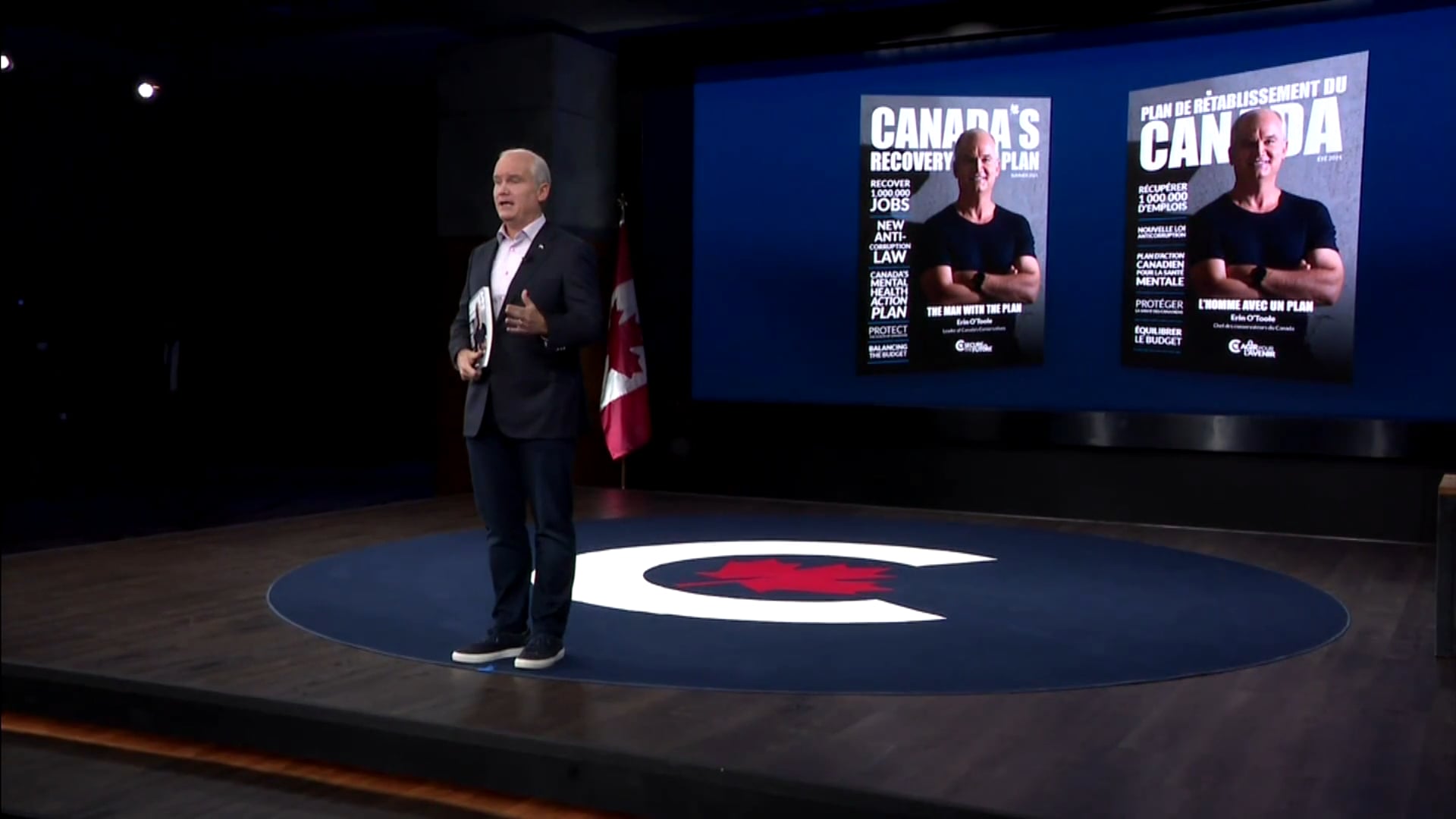
O’Toole would also “eliminate the unfairness” of the Impact Assessment Act, a federal statute passed by the Trudeau government that subjects resource development projects to an environmental assessment. The Tory leader promises to prioritize pipelines that export Canadian oil, ensure the Trans Mountain Expansion gets built and streamline environmental reviews for projects that partner early with First Nations.
In a pledge to get tough on crime, O’Toole wants to hire 200 more Mounties to crack down on gang violence and gunrunning. He also wants to introduce new mandatory minimum sentences for certain crimes, something advocates in the past have criticized as contributing to systemic racism in the justice system.
O’Toole was also scrutinized recently because his platform contains a more comprehensive plan to ban puppy mills than it does to address systemic racism, which is not mentioned at all in the document. Whether an O’Toole government would continue fighting advocates for First Nations kids in court is also overlooked.
“That’s a political calculation that’s been made, that it’s going to be OK for them to do that,” said Holmstrom. “Imagine running a campaign when you’re willing to offer more humane treatment to cute puppies than you are to Indigenous kids. If I wanted to wrap up the Conservative platform approach in a box in a bow, that would be it.”
In its analysis of the party platforms the AFN said “there appears to be an overreliance on natural resources in partnership with First Nations as the path to closing the gap” in O’Toole’s plan.
The organization pointed out that the Tories reference UNDRIP insofar as it empowers Indigenous groups to pursue economic opportunities “as opposed to the importance of First Nations self-determination in a holistic way.”
“It seems as though the Conservatives are very quick to promote Indigenous rights when it already accords with their chosen agenda — oil and gas development specifically and natural resources more broadly,” said Midzain-Gobin.
NDP promises new standard of free, prior and informed consent
In an article published Monday in The Conversation, Midzain-Gobin criticized the “glacial pace” of change under the Trudeau administration. He argued the next Canadian government needs to focus less on “good vibes” reconciliation and more on Indigenous self-determination — transferring power to Indigenous people — a shift he said voters should look for in the platforms.
On that front, the NDP promises to replace consultation with a new standard of free prior and informed consent, which neither the Liberal nor the Conservative platforms mention. NDP Leader Jagmeet Singh is pledging to end litigation over First Nations child welfare and appoint a special prosecutor to probe crimes at residential schools. It’s also the only platform to use the word genocide.

The NDP is the third most popular party nationally but sat fourth in Parliament behind the Bloc Québécois, something Singh hopes this election changes.
But pollsters are projecting another minority government in which the governing party must secure support from the opposition to pass its agenda, meaning the NDP may again find itself propping up the very government whose policies it proposes to change.
The provincial NDP holds power in British Columbia and has, at times, cast a shadow over the federal party’s Indigenous platform. A pledge to honour UNDRIP in B.C. has moved slowly and the province’s handling of First Nations jurisdiction, rights and title issues such as the Coastal GasLink pipeline standoff has been criticized.
“We’ve seen governments across the country not take the steps that this federal (NDP) party is promising to take,” said Midzain-Gobin. “There’s been some good work by the NDP government in B.C., and so I think there’s a possibility of something happening along those lines. But there’s also been a concerning critique by a lot of Indigenous groups within the province.”
Greens and Bloc Québécois platforms
The Bloc’s platform has a short, 10-paragraph chapter on nation-to-nation relationships. While it contains few policies or promises, it pledges support for Indigenous self-determination. The platform describes the party as an ally of Indigenous people and pledges to fight to dismantle the Indian Act while working at the federal level to reinforce inherent rights.
The Green Party is the last of the official debate participants to release its platform. Leader Annamie Paul will be looking to put internal party turmoil behind her following the defection of Jenica Atwin, one of the party’s only three MPs, to the Liberals.

The Greens also pledge to implement all the Truth and Reconciliation Commission’s calls to action, lift boil water advisories and seek justice for victims of residential schools. The Green platform, like the NDP platform but unlike the Liberal and Tory documents, promises to respect Indigenous sovereignty.
Reconciliation is one of the five themes that will be addressed in the English language official debate on Thursday, where the leaders will have a chance to elaborate on all these issues.
APTN will be streaming the debate live in Dené, Plains Cree and Inuktitut along with special coverage.




